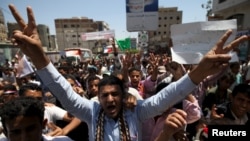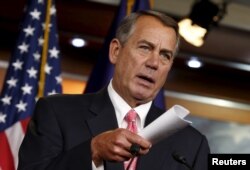While the Obama administration says the United States is supporting Arab allies that have launched attacks on Yemeni Shi'ite rebels, U.S. lawmakers are reacting with alarm to the latest crisis erupting in the Middle East.
Already a cauldron of conflicts, the Middle East is lurching toward a regional military confrontation centered on Yemen. The profusion of unrest is unsettling to the top Democrat on the Senate Foreign Relations Committee, Robert Menendez.
"I'm not so sure there isn’t an Arab country that would not consider [itself], in some form, at war. And Yemen is a real concern. It is where we were able to promote our interests in terms of attacking AQAP," he said, using shorthand for al-Qaida in the Arabian Peninsula.
Menendez pinned the blame for the Yemeni crisis on Iran, saying its backing of Shi'ite rebels had created instability and provoked Saudi Arabia and other Gulf States to take action. He also said he thought the situation in Yemen was "well beyond the ability of the president to contain."
Elsewhere on Thursday, the House Foreign Affairs Committee held a hearing on whether President Barack Obama's strategy to confront the self-proclaimed Islamic State in Iraq and Syria is working.
Testifying before Congress, several senior administration officials strongly defended Obama’s strategy to work with an international coalition to hit IS militants in precision airstrikes. Special presidential envoy John Allen, a retired Marine Corps general, said the coordinated airstrikes make a lot more sense than putting a large contingent of U.S. ground troops in the region.
“The presence of foreign troops from outside that region often ultimately creates a reaction within that region that is focused on those foreign troops," he said. "That may have in fact a destabilizing effect.”
Allen and other witnesses acknowledged that the situation in Syria is more challenging than that in Iraq because the U.S. does not have a government partner there. Foreign Affairs Chairman Ed Royce accused the president of not having a plan for confronting the Islamic State in Syria.
“On the path forward in Syria, most administration officials seem to suggest we can figure it out later," Royce said. "Our slow action is creating a crisis of confidence among our allies.”
Policy viewed as problematic
At a news conference Thursday, House Speaker John Boehner was asked about the current turmoil in much of the Middle East, and he blasted Obama.
"The world is starving for American leadership, but America has an anti-war president" with "no overarching strategy" to deal with threats, he said.
Boehner also slammed the president’s request for a congressional resolution authorizing his administration to continue ongoing military operations against IS.
“The biggest problem with the authorization of the use of military force, the request that came from the president, is the president is asking us to give him less authority than he has today in the prior authorization," Boehner said. "Where is the robust strategy to take on the terrorist threat?”
Obama is basing current military operations in Iraq and Syria on force authorizations issued after September 11, 2001, to combat terrorism.
The highest ranking Democrat on the House Foreign Affairs Committee, Eliot Engel, said Congress needs to work together to pass a use-of-force resolution as an important signal to U.S. troops and to the world.
“The language sent us by the president is not perfect, but I believe it is a good start," he said. "So let’s work together to craft a bipartisan [authorization]. Let’s tailor it to the needs of our troops and this mission.”
But the chairman of the Senate Foreign Relations Committee, Bob Corker, expressed dismay over the administration’s entire outreach to the region.
"In Iraq, we are helping Iran make Iraq a better place for Iran. In Yemen, we are working with the Saudis to get an Iran-aided group out, and then if you look at Syria, we are playing footsie," or coyly engaging, "with both sides," Corker said.
"The administration is having a degree of difficulty deciding who our friends are and who our enemies are," he added. "And so there is a lot of consternation about where America is in the Middle East, and you are beginning to see a shift of alliances, and it is creating some turmoil there."
Withholding blame
Fellow Republican Senator Jeff Flake is unsure whether any Washington-directed policy could have prevented events currently unfolding in Yemen.
"I don’t think anybody could have predicted what’s gone on the last month. I haven’t been enamored with the president’s foreign policy, but this one — it’s a tough neighborhood."













